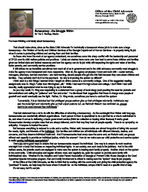Office of the Child Advocate
3312 Northside Drive, Suite D-250 Macon, Georgia 31210
478-757-2661 or 1-800-254-2064 www.gachildadvocate.org
______________________________________________________________________________
Bureaucracy...the Struggle Within
By: Tom C. Rawlings, Director
I've been thinking a lot lately about bureaucracy.
That should make since, since as the State Child Advocate I'm technically a bureaucrat whose job is to make sure a large bureaucracy the Division of Family and Children Services of the Georgia Department of Human Services is properly doing its job when it comes to protecting children and serving them and their families.
As those who know the work of our agency understand, we sometimes come into sharp conflict with the leadership and personnel of DFCS over its child welfare policies and practices. Lately our clashes have come over how best to serve those children and families given our limited state and federal resources and how the agency can do its job while still respecting the rights and value of families, foster parents, and community service providers.
It still strikes me as incredible sometimes how much all of us in government and in the child advocacy community must struggle to make the agency more transparent and more responsive. After all, the agency employees I know and work with -- social workers, managers, attorneys, number-crunchers are hard-working, decent people who got into this field because they care about children and families. They certainly don't do it for the paycheck. So why is improving the system so difficult?
I think back to a few things I learned when I taught an ethics course at a community college. One of the suggested reading assignments was Dr. King's "Letter from Birmingham Jail." While I had read it in high school and college, I don't think I had until recently, really appreciated what he was trying to say in that letter.
As you may recall, Dr. King was responding to a statement from a group of local clergy pooh-poohing the need for protests and demonstrations and calling for "patience" and "law and order." He dismissed their suggestion that those in charge were people of goodwill and would eventually see the light. Rather, Dr. King wrote, sometimes you have to confront the system:
"Lamentably, it is an historical fact that privileged groups seldom give up their privileges voluntarily. Individuals may see the moral light and voluntarily give up their unjust posture; but, as Reinhold Niebuhr has reminded us, groups tend to be more immoral than individuals."
That last statement has a lot to do with the difficulties of reforming a bureaucracy. As the sociologist Max Weber said long ago, bureaucracies are wonderfully efficient organizations. Each person in them is specialized to do a job that he or she is well-trained to do, and when it comes to delivering a basic government service (think tax collection or issuing driver licenses) it works great. Bureaucracies develop complex rules that are always followed, and in that way they treat all people equally. There is no sympathy, no antipathy. Everyone is treated the same.
But because everything is reduced to a rule and a routine, Weber said, bureaucracies are almost incapable of taking into account the needs, rights, and interests of the individual. Our families and children are all individuals with different interests, desires, and concerns, and they deserve individual treatment. And if bureaucracies treat every case the same and, as Niebuhr said, are groups without real capacity to provide an individual justice, what's the answer? How do we make sure our child protective and service system is really serving individuals appropriately?
There are some good ways to ensure that our bureaucracies respect the individual. One way is to ensure its work receives oversight from a body that focuses on respecting individual rights. In our society, one such body is the judiciary. And in the child welfare arena, the juvenile courts are equipped to make sure the system is treating each family properly. Another check on the system is the community. Child advocates and regular citizens must, and regularly do, push the system to provide each family with individualized care. Whether it's the Adoptive and Foster Parent Association of Georgia or Prevent Child Abuse Georgia or the Court Appointed Special Advocates program, that community involvement is critical to making sure the "system" does its job properly.
At the Office of the Child Advocate, we like to think that by working with the community and giving the child protection agency the "pushback" it needs, we help keep the focus where it should be: on the individual, unique child in need of a specific kind of help.
It's not easy, but it's our job.
Tom Rawlings, Georgia's Child Advocate for the Protection of Children, was appointed by Governor Sonny Perdue to assure quality and efficiency in Georgia's child protective systems. The Office of the Child Advocate is a resource for those interested in the welfare of our state's neglected and abused children. Tom can be reached through the OCA website at www.gachildadvocate.org .
Office of the Child Advocate
3312 Northside Drive, Suite D-250 Macon, Georgia 31210 478-757-2661 or 1-800-254-2064 www.gachildadvocate.org
Tom Rawlings, Georgia's Child Advocate for the Protection of Children, was appointed by Governor Sonny Perdue to assure quality and efficiency in Georgia's child protective systems. The Office of the Child Advocate is a resource for those interested in the welfare of our state's neglected and abused children. Tom can be reached through the OCA website at www.gachildadvocate.org .
